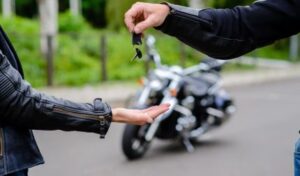Being a motorcycle fan, the idea of your bike being totaled is scary. It could happen after a bad crash or if your bike gets really damaged. We’ll look at what happens when your motorcycle is totaled. This includes filing an insurance claim and what you can do next.

Key Takeaways
- Understanding the definition of a “totaled” motorcycle and the factors that determine a total loss
- Properly filing an insurance claim and working with an adjuster to assess the damage and value
- Evaluating the settlement offer and negotiating for a fair payout
- Exploring the options available after a total loss, such as keeping the salvage motorcycle or replacing it
- Protecting yourself from the risk of a total loss through proper insurance coverage and maintenance
Understanding Motorcycle Total Loss
When you own a motorcycle, you might hear about “total loss.” But what does it mean when a bike is totaled? Knowing what makes a motorcycle a total loss helps you deal with insurance claims better.
Defining a Totaled Motorcycle
A motorcycle is called “totaled” if fixing it costs more than its actual cash value (ACV). Insurance companies decide this to see if paying the ACV is cheaper than fixing it. The ACV looks at the bike’s age, mileage, and condition before the accident.
Factors Determining Total Loss
- Extent of damage: The more damage, the more likely it’s a total loss.
- Repair costs: If fixing it costs more than the ACV, it’s totaled.
- Motorcycle’s age and mileage: Older bikes with more miles have a lower ACV, making them more likely to be totaled.
- Market value: The bike’s market value, based on make, model, and condition, affects the total loss decision.
When a motorcycle is totaled, the insurance pays the ACV. This is what the bike would sell for in the market. Knowing these factors helps you guess when a bike might be totaled and how to handle insurance claims.
“If the estimated repair costs exceed the motorcycle’s actual cash value, it’s considered a total loss.”
Filing an Insurance Claim
If your motorcycle has been declared a total loss, the first step is to file an insurance claim. This important process involves contacting your insurance provider and providing detailed information about the incident. You’ll also need to submit the necessary documentation. We’ll guide you through the steps to file a motorcycle insurance claim after a total loss.
- Contact Your Insurance Provider: Reach out to your insurance company as soon as possible to start the claims process. Be ready to give the date, time, and location of the incident. Also, describe what happened in detail.
- Gather the Required Documentation: Your insurance company will ask for various documents. These include the motorcycle’s title, registration, and photos of the damage. Make sure you have these items ready to speed up the claim filing.
- Submit the Claim: After gathering the necessary information, submit your insurance claim. You can do this online, by phone, or through your insurance agent. Be patient, as your insurance provider will need to review the details carefully before making a decision.
- Cooperate with the Adjuster: An insurance adjuster will be assigned to your case. They will assess the damage and determine the actual cash value of your motorcycle. Cooperate fully with the adjuster, providing any additional information or access they may need.
Remember, the filing motorcycle insurance claim total loss process can be complex. But by following these steps, you’ll be well on your way to resolving your steps to file motorcycle insurance claim after total loss.
“The key to a successful insurance claim is being prepared and providing all the necessary information upfront.”
Assessing the Damage and Valuation
After you file your motorcycle insurance claim, you’ll work with an adjuster. They will check the damage and figure out your motorcycle’s value. This step is key to knowing how much money you’ll get from your insurance.
Working with an Adjuster
The adjuster will look at your motorcycle closely. They’ll see how much damage there is and get all the info they need. They’ll look at things like the make, model, year, and how much you’ve driven it.
It’s important to be there when they inspect it. Working together with the adjuster helps make sure they get it right.
Determining the Actual Cash Value
The actual cash value (ACV) of your totaled motorcycle is what the insurance company will offer you. This value is based on what your bike was worth before the accident. The adjuster will look at what similar bikes are selling for in your area.
Knowing how the actual cash value is figured out is important. By working well with the adjuster and giving them all the info, you help make sure the value is fair.
“The adjuster’s assessment is the foundation for the settlement offer, so it’s important to be proactive and provide them with all the relevant information about your motorcycle.”
Receiving the Settlement Offer
After the insurance company checks the damage, they’ll offer a settlement. This is the amount they’re willing to pay for your totaled motorcycle. But, this first offer might not always be fair.
Negotiating the Settlement Amount
If the offer seems too low, you can try to negotiate. Negotiating the motorcycle insurance claim total loss settlement can help you get a better deal. This way, you can make sure you get paid what your motorcycle is worth.
To negotiate well, follow these tips:
- Gather Evidence: Collect documents like recent sales of similar bikes to show your bike’s value.
- Communicate Clearly: Talk to the insurance adjuster nicely but firmly, using your evidence to support your claim.
- Be Persistent: Stand up for a higher settlement if you think the offer is unfair.
- Seek Professional Assistance: If you can’t agree, think about getting help from a motorcycle insurance claims expert or lawyer.
Remember, negotiating is about getting a fair deal for your motorcycle. By being proactive and showing your evidence, you can get a better payout.
“Negotiating the settlement offer is an important step in ensuring you receive the compensation you deserve for your totaled motorcycle.”

What Happens If My Motorcycle Is Totaled
Learning your motorcycle is a total loss is tough. It means the repair cost is more than its value. This affects your ride, insurance, and wallet.
First, you lose your main way to get around. You’ll have to find new ways to travel. This could mean using public transport, ride-sharing, or buying a new bike.
Having a totaled bike also changes your insurance. The payout might not cover the full cost of a new one. You might have to negotiate for more money.
The financial hit can be big. You’ll have to pay off any loans or leases on the bike. This can be tough, especially if you depend on it for daily travel.
If your bike is totaled, knowing what to do is key. Talk to your insurance, find new ways to travel, and manage your money well. This way, you can get back on the road quickly.
Options After a Total Loss
After getting a settlement offer from your insurance for your totaled motorcycle, you have to think about what to do next. You have a few choices, each with its own good and bad sides. Let’s look at these options to help you make the best choice for your situation.
Keeping the Salvage Motorcycle
One option is to keep the salvage motorcycle, even if it’s been declared a total loss. This might save you money if you’re okay with fixing it up yourself. By keeping it, you could get back on the road for less than buying a new one. But, you should really think about the repair costs and the bike’s condition before deciding.
Replacing Your Motorcycle
If you want a new start, you can use the insurance money to buy a new or used bike. This way, you can get a bike that’s in better shape and meets your needs now. The settlement can help with the down payment, making it easier to finance a new bike. When replacing a totaled motorcycle, make sure to look at your options and find a bike that fits your budget and riding style.
Whatever you decide, it’s important to think about the options after motorcycle is totaled carefully. Understanding the keep salvage motorcycle after total loss and replace totaled motorcycle choices will help you deal with the loss confidently.

Protecting Yourself from Total Loss
Accidents and unexpected events can cause a motorcycle to be totaled. But, there are ways to lower this risk. We’ll talk about keeping your bike in good shape, staying safe, and insurance plans to avoid a total loss.
Keeping your motorcycle well-maintained is key to avoiding total loss. Regular checks, tune-ups, and replacing old parts can help. This keeps your bike running smoothly and reduces the chance of accidents or breakdowns.
Following motorcycle safety tips to avoid total loss is also important. Always wear the right safety gear like helmets and gloves. Also, be careful and follow traffic rules to avoid crashes.
| Maintenance Tips | Safety Tips |
|---|---|
| Regular inspections Tune-ups Replacing worn parts | Wear proper safety gear Obey traffic laws Maintain safe following distance |
Having the right insurance is also crucial. Comprehensive coverage that includes collision and theft can help pay for repairs or a new bike. By choosing the right insurance, you can prevent motorcycle total loss and ride with confidence.
“Taking the time to properly maintain your motorcycle and prioritize safety can go a long way in preventing a total loss situation.”
While accidents can’t be completely avoided, being careful with maintenance, safety, and insurance can lower the risk of a total loss. By being proactive, you can enjoy riding without worrying about a total loss.
Dealing with the Emotional Impact
Losing a motorcycle to a total loss can be very emotional. For riders, their bike is more than just a way to get around. It’s a symbol of freedom, adventure, and a personal connection. When this connection is broken, it’s normal to feel sad, angry, and lost.
Coping with the Loss
The first step is to accept and understand your feelings. It’s okay to grieve the loss of your bike. Give yourself time to process your emotions. Talking to friends or joining online rider communities can help.
While dealing with your feelings, also focus on the practical steps. This includes filing an insurance claim and looking into replacing your bike. Breaking down these tasks helps you regain control. Remember, the emotional impact of losing a bike can last, but with support and strategies, you can come out stronger.
FAQ
What is the process for filing a motorcycle insurance claim after a total loss?
Contact your insurance provider first and report the incident. You’ll need to give details about the accident or damage. Also, submit any necessary documents.
The insurance company will then check the situation. They will decide if your motorcycle is a total loss.
How do insurance companies determine if a motorcycle is a total loss?
Insurance companies look at several factors. These include the bike’s age, mileage, and damage extent. If repair costs more than the bike’s value, it’s considered a total loss.
What happens if my insurance company offers a settlement amount that I feel is too low?
If you don’t agree with the settlement offer, you can negotiate. Show evidence like comparable sales or repair estimates. This can help prove your motorcycle’s value is higher than the offer.
Can I keep the salvage motorcycle after it’s declared a total loss?
Yes, you can keep the salvage motorcycle in some cases. This lets you keep the damaged bike and use the insurance payout for repairs. But, consider the pros and cons before making a decision.
What are the emotional impacts of dealing with a totaled motorcycle?
Losing your motorcycle can be tough and emotional. It’s normal to feel frustrated, upset, or overwhelmed. Acknowledge your feelings, seek support, and look into counseling or motorcycle communities for help.
How can I prevent my motorcycle from being declared a total loss in the future?
To avoid a total loss, focus on maintenance and safe riding. Regular servicing and safety gear are key. Also, choose the right insurance policy to protect your bike.






